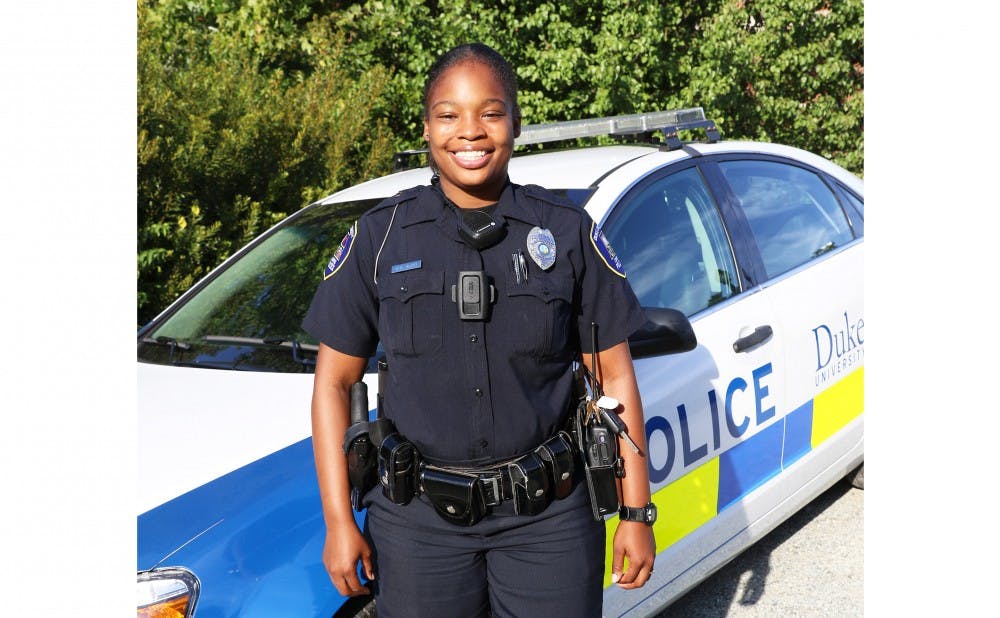Although body cameras worn by police officers have become common, questions still remain about public access to the footage in North Carolina.
Duke University Police Department has deployed body cameras since August 2015. Vice President for Administration Kyle Cavanaugh noted that all Duke police officers are required to use cameras when they respond to a call for service, which is university protocol. After each shift, the footage from the body-worn cameras is downloaded onto secure, proprietary storage, he explained. However, the ability of the public to access the footage from the cameras once stored is limited.
“Access to the images is controlled to protect community members’ privacy and are not considered public records,” Cavanaugh wrote in an email.
Whether members of the public should be given access to recordings of incidents they took part in is currently under review in the state legislature. In the North Carolina General Assembly’s short session this Spring, legislation that would provide guidance to local law enforcement agencies on this issue surfaced.
House Bill 972, which was proposed in the short session, contains language noting that recordings from body cameras are not public records. The bill would give the head of local law enforcement agencies the power to determine whether to disclose a recording to the person requesting the footage.
Some critics of the legislation worry that its guidelines for release are not specific enough. They argue that allowing local law enforcement discretion could impede transparency.
“[House Bill 972] allows for a lot of discretion with the law enforcement agencies to ultimately make the decision, which I think is just going to cause them to do what they’ve been doing, which is to not release the recordings when they are of public value or of public interest,” said Susannah Birdsong, policy counsel for the American Civil Liberties Union of North Carolina.
Birdsong noted that gaining public access to body cameras has been difficult in North Carolina because local law enforcement agencies limit access to records that are relevant to an ongoing criminal investigation or an officer’s performance evaluation.
If the footage is being used to evaluate an officer, it becomes part of the officer’s personnel file, which is confidential and protected under state law. North Carolina’s personnel records law is broad compared to other states, which is why local law enforcement officials have called for clarification on the protocol, especially on the personnel records point, Birdsong noted.
“Should legislation be introduced, obviously we would fully comply,” Cavanaugh wrote.
Durham City Manager Tom Bonfield noted that the Durham City Council has postponed its purchasing decision for body-worn cameras until later this summer in order to allow for input from newly-selected Chief of Police Cerelyn Davis, who will begin her new role June 6.
“The big thing was the timing with the new police chief coming on board,” Bonfield said. “We wanted to give her an opportunity to weigh in because ultimately she will own the implementation and deployment, so she should be a part of the decision process.”
Bonfield noted that the uncertainty about the General Assembly’s policy decision in regards to the body cameras is another factor that delayed Durham’s decision.
“Depending on whether they adopt the state-wide policy or not, we would have to go back and kind of compare what was in the state-wide policy versus what was in some of our drafts associated with that,” he said. “We expect they will be done with their work by the time this comes back up at the end of the summer as well.”
Bonfield added that discussions about Durham’s body camera policy have mainly centered around technology—particularly storage of the footage, such as whether to adopt a server-based or cloud-based model.
He noted that he anticipates finalizing purchasing information in early August, as soon as the City Council returns from its summer break.
Get The Chronicle straight to your inbox
Signup for our weekly newsletter. Cancel at any time.

